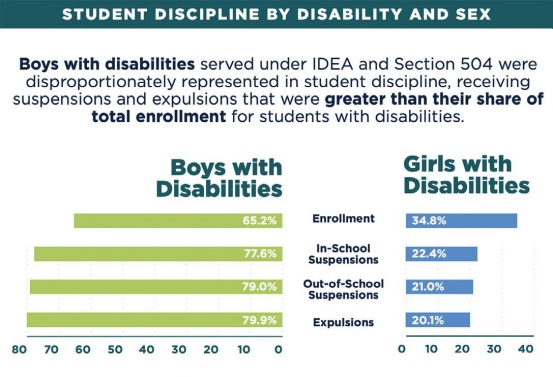-ities aged 3–21 served under IDEA who were suspended out of school or expelled for more than 10 school days.
The impact is alarming:
- Over 3 million missed days from school due to out-of-school suspension
- Out-of-school suspensions do not serve as a deterrent for future problem behavior and can lead to school dropout We cannot suspend our way to better behavior, but we can invest in what works.
I am proud that OSEP has invested millions of dollars over decades to deeply consider how to best address the behavioral needs of children with disabilities. These investments have yielded powerful, evidence-based strategies and approaches that can be used by schools and early childhood programs to mitigate or even prevent interfering behavior before it occurs. In fact, according to the Center on Positive Behavioral Interventions and Supports (pbis.org) and the National Center for Pyramid Model Innovations (challengingbehavior.org), implementation of positive behavioral interventions and supports (PBIS) results in:
- Improved outcomes, such as increased academic achievement and social and emotional competence for children with disabilities, and reduced bullying behaviors;
- Significant reductions in inappropriate behavior;
- Reduced use of exclusionary discipline, including reduced discipline referrals and suspensions; and
- Reduced use of restraint and seclusion.
When we pair these tools with leadership and motivation to have honest and reflective discipline discussions, the outcomes can be powerful for children with disabilities and their families.
Over the next few months, I will be writing a series of blog posts that highlights challenges and opportunities before us and connects stakeholders with OSEP funded resources. I will address topics such as informal removals, alternatives to exclusionary discipline, and proactive approaches to supporting a child's behavioral needs; and will provide you with resources you can use in your own discipline discussions. •
Additional information about OSEP's Guidance to Help Schools Support Students with Disabilities and Avoid Disparities In the Use of Discipline, see References.

References
- OSEP Dear Colleague Letter on Implementation of IDEA Discipline Provisions. (July 19, 2022) English | Español: sites.ed.gov/idea/idea-files/dcl-implementation-of-idea-discipline-provisions
- Questions and Answers Addressing the Needs of Children with Disabilities and IDEA's Discipline Provisions. (July 19, 2022) English | Español: sites.ed.gov/idea/idea-files/qa-addressing-the- needs-of-children-with-disabilities-and-idea-discipline-provisions/
- Positive, Proactive Approaches to Supporting the Needs of Children with Disabilities: A Guide for Stakeholders. (July 19, 2022) English | Español: sites.ed.gov/idea/idea-files/guide-positive- proactive-approaches-to-supporting-children-with-disabilities/
- OSEP 2022 Behavior, Discipline Guidance Video (July 2022): vimeo.com/731089146 Resource Guides on Positive, Proactive Approaches to Discipline: osepideasthatwork.org/federal- resources-stakeholders/topical-issues/2022-osep-discipline-behavior-guidance
ABOUT THE AUTHOR:

Valerie C. Williams serves as the director in the Office of Special Education Programs (OSEP) within the Office of Special Education and Rehabilitative Services at the U.S. Department of Education. In this role, she is responsible for overseeing administration of the Individuals with Disabilities Education Act (IDEA), which authorizes formula grants to states under IDEA Part B and to lead agencies for the infants and families program under IDEA Part C. IDEA also authorizes discretionary grants under IDEA Part D to institutions of higher education and other non-profit organizations to support grants for state personnel development, technical assistance and dissemination, technology, and parent training and information centers. Williams most recently served for six years as senior director of Government Relations and External Affairs at the National Association of State Directors of Special Education. She has decades of experience, which include supporting state-level special education leaders by overseeing federal government public policy activities, federal regulatory affairs, public relations, and key initiatives to promote equity and guide positive systemic change, thereby improving outcomes for students with disabilities.
